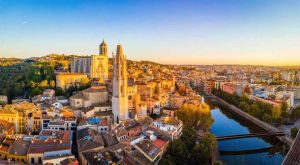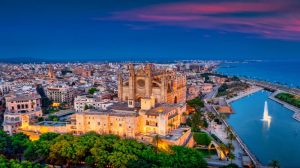Girona, Catalonia: Hidden Gardens Of Angels, The Occult, Kabbalah, And Miracles

Girona in Catalonia, Spain, is an experience in polarities, capturing the romance of Paris but also a tinge of foreboding prevalent in Moscow. Girona is both a very popular modern destination and an ancient town filled with occulted history and occult symbolism. Somehow these polar opposites manage to coexist, perhaps because the former is ignorant of the latter, and the latter could not care less about the former.
As Patrice Chaplin explains in her memoir City of Secrets, Girona discloses its secrets slowly, and only to the privileged few, and then only layer by layer, like peeling an onion. Patrice has spent her lifetime writing about the mysteries that she first encountered as a 15-year-old bohemian fleeing England who arrived by chance in Girona in the 1950s. Patrice is not alone in finding something compellingly attractive about Girona. The city has been the setting for a number of novels, including Caroline Roe’s acclaimed medieval historical series, The Chronicles of Isaac of Girona, and the historical novel The House of Memory, by Lucia Graves (Robert Graves’ daughter). Its picturesque streets were a film location for the sixth season of Game of Thrones, as well as other movies.


Arial view of modern Girona (alexey_fedoren/Adobe Stock)
Modern Girona is a city of 100,000 people, capital of the province of Girona, located in the autonomous region of Catalonia in northeastern Spain. It is 100 kilometers (62 miles) northeast of Barcelona, 70 kilometers (44 miles) from the Pyrenees and the French border, and 40 kilometers (25 miles) from the nearest Mediterranean coast. Yet modern Girona is a thin veneer layered over thousands of years of habitation, and beneath the surface are hidden many secrets.
History Of Girona
There is proof of habitation in the area around Girona going back more than 10,000 years. Girona itself was first settled by the Iberian Ausetani tribe, who called it Gerunda. In the first century BC, it was conquered by the Romans under Pompey the Great, who built a triangle-walled fortress there, the seed for what soon became the Roman city of Gerunda. After the Romans left, it was conquered by the Visigoths, then briefly by the Moors in 715. Charlemagne (or, rather, his lieutenants) reconquered it in 785, although it was periodically sacked by the Moors for several more centuries.